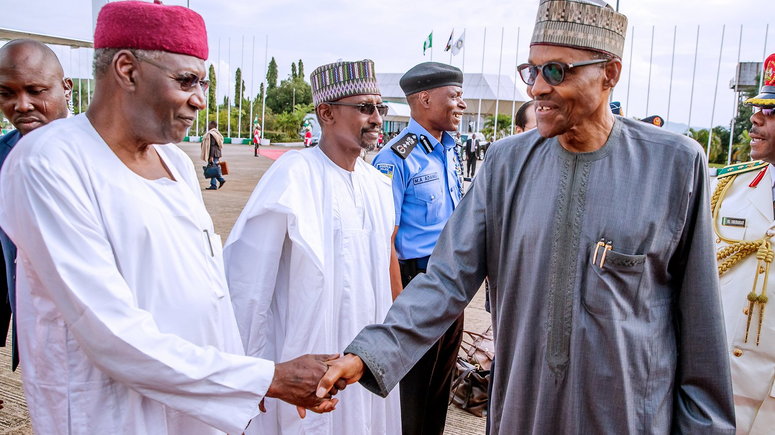- Buhari Approves N10bn for Lagos, N5bn For NCDC, Shut Airports
President Muhammadu Buhari on Thursday announced, through his official twitter channel @MBuhari, new guidelines as Nigeria combat coronavirus pandemic.
The President said after extensive briefings on the state of the nation in regards to the COVID-19 pandemic from relevant government agencies and Lagos State Government.
Buhari approved a total sum of N10 billion for Lagos, the frontline state of coronavirus battle in the country, and released N5 billion to the Nigeria Center for Disease Control (NCDC) to equip and expand its facilities.
Also, the president directed that all the nation’s International Airports and land borders should be closed for four weeks to curtail the spread of the virus that has risen to 65 cases on Thursday.
Below is a complete list of the President provisions and guidelines:
1. The immediate release of a 10 billion Naira grant to Lagos State, which remains the epicentre of the Covid-19 outbreak in Nigeria. This grant will enable Lagos State increase its capacity to control and contain the outbreak, while also supporting other States with capacity building.
2. The immediate release of a 5 billion Naira special intervention fund to the Nigeria Center for Disease Control (NCDC) to equip, expand and provide personnel to its facilities and laboratories across the country.
3. The Nigerian Air Force is already making its fleet available to the Presidential Task Force on Covid-19, to enable a better coordinated and more effective response across the country.
4. To protect our homeland from external exposure, I directed the immediate closure of our International Airports and Land Borders for four weeks in the first instance, to enable us put up the appropriate policies, processes and infrastructure to cope with suspected and confirmed cases at home, without risking a compounding of the situation with more imported cases.
5. The inconvenience caused by these flight and travel restrictions to our fellow citizens abroad who want to return home is regrettable, but it is necessary for the greater good, and I thank you all for your understanding and cooperation.
6. I have also directed that only cargo vessels that have been at sea for more than 14 days be allowed to dock in our ports, after the crew have been tested and confirmed disease-free by the Port Health Authorities. This 14-day restriction however does not apply to vessels carrying oil and gas products as by their nature, there is minimal human contact.
7. We have also suspended the movement of commuter trains to limit the spread of the virus to other parts of the country.
8. I have directed the NCDC to draft all its recent retirees back into service to beef up our manpower as we respond to the pandemic.
9. Furthermore, all NCDC staff and experts who are away on training or international assignments are to return immediately. Already the Nigerian Air Force (NAF) are conducting an evacuation mission to bring back some of our specialists in Central Africa, to enable them support the national response.
10. I commend the monetary policy authorities for their financial intervention to support our entrepreneurs and companies as we go through this difficult time. We are also looking at fiscal measures to minimise the negative impact of this pandemic on the livelihood of millions of Nigerians.
11. As you are aware we have begun the process of reviewing the federal budget. We shall communicate our fiscal interventions once the budget review process is concluded.
12. In the meantime, I have directed the Minister of Industry, Trade and Investment, to work with the Manufacturers Association of Nigeria, to ensure that all production of essential items such as food, medical and pharmaceutical products continues unhindered.
13. We are engaging our international friends and partners to share knowledge and to seek their support in our response to the pandemic. We are grateful for the show of support thus far – we have already started receiving goods and supplies intended to help us scale up our efforts.
14. Let me specially thank and commend all of the hard and heroic work being done by our medical personnel, the NCDC, Port Health Authorities, Security Agencies, State Governments, and all ad-hoc staff and volunteers.
15. I urge all Nigerians to be mindful of those among us who seek to spread panic and misinformation, and sow confusion at this time. We must all pay attention only to the relevant government agencies working day and night to make accurate and useful information available to the public.
16. I will also ask all of us to strictly obey all public health guidelines and instructions issued by the Federal and State health authorities, regarding personal hygiene and social distancing. These guidelines will be updated from time to time as new information and treatments are obtained.
17. In the meantime, I want to assure all Nigerians, that the Federal Government remains committed to protecting all Nigerians. We seek your full support and cooperation as we go through this very difficult time. Together we will triumph over this pandemic.
Muhammadu Buhari
26/03/2020

 Forex3 weeks ago
Forex3 weeks ago


 Naira2 weeks ago
Naira2 weeks ago
 Billionaire Watch2 weeks ago
Billionaire Watch2 weeks ago




 Naira2 weeks ago
Naira2 weeks ago




 Naira2 weeks ago
Naira2 weeks ago




 Naira1 week ago
Naira1 week ago




 Naira4 weeks ago
Naira4 weeks ago




 Naira3 weeks ago
Naira3 weeks ago






















